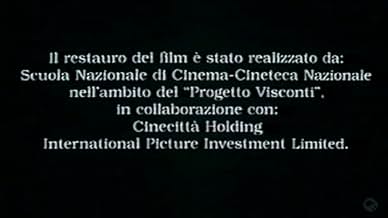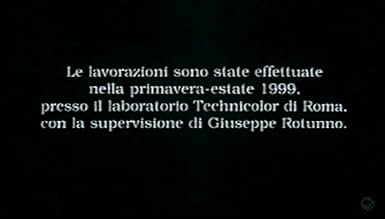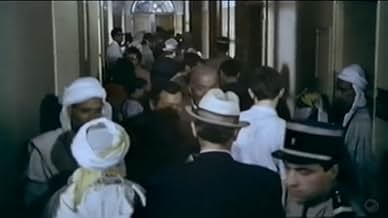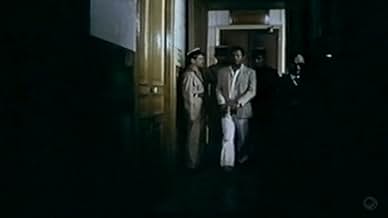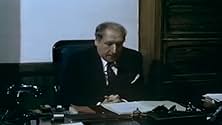PUNTUACIÓN EN IMDb
7,1/10
3,4 mil
TU PUNTUACIÓN
Un hombre se enfrenta a un juicio por asesinato. El tribunal es parcial debido a sus cualidades personales.Un hombre se enfrenta a un juicio por asesinato. El tribunal es parcial debido a sus cualidades personales.Un hombre se enfrenta a un juicio por asesinato. El tribunal es parcial debido a sus cualidades personales.
- Dirección
- Guión
- Reparto principal
- Premios
- 4 nominaciones en total
Jean-Pierre Zola
- Employer
- (as Jean Pierre Zola)
Reseñas destacadas
I had heard about this movie and wanted to see it for years, but it's one of that increasingly smaller handful of pictures featuring notable names and a world-class filmmaker (and based on such a book as it is) that is not available, and never has been, on home video (VHS/DVD/VoD, Beta, you name it). So to see it in 35mm is something of a major treat - the question is, how does it hold up almost 50 years later, adapting a book that is nearly 75 years old? Is it timeless? Well, yes... and sort of no, but I'll get to that.
What Visconti does is actually adapt the book quite closely, and even gets into the tone of not so much existential despair as existential don't-give-a-damn. Meursault (Mastroianni) is a character who is affected by the world around him, though that's not to say he's a cynic per-say or completely one to not connect with anyone; clearly he connects with Marie, who cares for him dearly, and he meets a 'friend' in a man who repeatedly hits his woman and has him write a letter for him under dubious circumstances. Oh, and his mother dies to begin with, which becomes a major point of contention later in the story.
The point is that through this story of a man who works as a clerk and keeps to himself and doesn't say much, unless he has something to say or has to, Visconti finds a tone that is curious and yet also distant, which is a kind of contradiction in terms that fits the Camus' style of absurdism. This is a world where there is underlying political strife; it's set in Algiers at a time when France still occupied it (though it's populated by Italians just buy into them being all French, ironic that Karina gets dubbed), and the centerpiece that sets this character heading to oblivion comes when he shoots an Arab for.... what reason? Was it because he and another guy were bothering his friend with a knife? No, no real intention that way. It was... the sun, maybe(?) Who knows?
Meursault is a particular kind of character to play who has such a worldview that is tricky to make into a compelling sight to want to be with for 105 minutes. He is even called, in almost polite terms, "peculiar", though at other times he's called worse when it comes time for those long (but totally engrossing and fascinating) courtroom scenes where it becomes almost a farce of pulling emotional-teeth. So who do you get to play him? Though he considered Alain Deleon (which would've been... not bad for sure), Mastroianni is so good a match that it's hard to picture anyone else. While he is older than one might've pictured the character in the book - not that we get too clear an idea of what he looks like based on his first person take on things, but he seems fairly young - it doesn't matter after a few minutes.
This is the Mastroianni from La Dolce Vita only *more* broken, like if he just decided 'f*** it' and went even further into just disconnecting from the world around him. Only it's not the world of the rich, on the contrary Meursault is surrounded by people of his own class - though some of course are white while others are the Arabs, as they're called - but it's not that he has any prejudice either way. He just doesn't care about things that he doesn't have to, and this includes religion and whether there's a God or not.
What's tricky for Mastroianni to play, but what he pulls off and makes palpable, is this sense of quiet desperation hidden under a calm demeanor. He can get emotional, he can even enjoy life and of course Marie by her side (and though we don't hear her actual speaking voice, by the way, Karina is very good here too, playing the opposite side as someone who is ALL emotions and vulnerability). But that is the key isn't it is the vulnerability factor; when reading the book, which is a little better (hard not to be when it's one of the greats... ever, arguably), there's an edge and a rawness to the narrative that is difficult to get on film, much less by someone like Visconti who usually in his movies thrives on high, operatic emotions.
What's intriguing is how Visconti pulls back in some ways, though he still keeps the camera moving when he can - one aspect that does date is is the over-use of zooms (sometimes it's fine, other times it's closer to 'we get it, move on, this device isn't engaging with the text like you think it is') - and gets certain set pieces and places to be effective and affecting in a purely cinematic way. When our (anti?)hero goes forward to do his killing, it's on a beach where Mastroianni moves like in a total daze with the music playing in such an eerie way that is both hypnotic and terrifying. And places like the jail cell in the last section of the film or even a stairwell that is at Geursalt's apartment, they feel like real places but also crafted for dramatic effect, if that makes sense.
Most memorable and one of Visconti's highlights as a filmmaker in his career are those final scenes in the prison where a discussion about God and a place in the world happens that is so incredible words can't do it justice.
What Visconti does is actually adapt the book quite closely, and even gets into the tone of not so much existential despair as existential don't-give-a-damn. Meursault (Mastroianni) is a character who is affected by the world around him, though that's not to say he's a cynic per-say or completely one to not connect with anyone; clearly he connects with Marie, who cares for him dearly, and he meets a 'friend' in a man who repeatedly hits his woman and has him write a letter for him under dubious circumstances. Oh, and his mother dies to begin with, which becomes a major point of contention later in the story.
The point is that through this story of a man who works as a clerk and keeps to himself and doesn't say much, unless he has something to say or has to, Visconti finds a tone that is curious and yet also distant, which is a kind of contradiction in terms that fits the Camus' style of absurdism. This is a world where there is underlying political strife; it's set in Algiers at a time when France still occupied it (though it's populated by Italians just buy into them being all French, ironic that Karina gets dubbed), and the centerpiece that sets this character heading to oblivion comes when he shoots an Arab for.... what reason? Was it because he and another guy were bothering his friend with a knife? No, no real intention that way. It was... the sun, maybe(?) Who knows?
Meursault is a particular kind of character to play who has such a worldview that is tricky to make into a compelling sight to want to be with for 105 minutes. He is even called, in almost polite terms, "peculiar", though at other times he's called worse when it comes time for those long (but totally engrossing and fascinating) courtroom scenes where it becomes almost a farce of pulling emotional-teeth. So who do you get to play him? Though he considered Alain Deleon (which would've been... not bad for sure), Mastroianni is so good a match that it's hard to picture anyone else. While he is older than one might've pictured the character in the book - not that we get too clear an idea of what he looks like based on his first person take on things, but he seems fairly young - it doesn't matter after a few minutes.
This is the Mastroianni from La Dolce Vita only *more* broken, like if he just decided 'f*** it' and went even further into just disconnecting from the world around him. Only it's not the world of the rich, on the contrary Meursault is surrounded by people of his own class - though some of course are white while others are the Arabs, as they're called - but it's not that he has any prejudice either way. He just doesn't care about things that he doesn't have to, and this includes religion and whether there's a God or not.
What's tricky for Mastroianni to play, but what he pulls off and makes palpable, is this sense of quiet desperation hidden under a calm demeanor. He can get emotional, he can even enjoy life and of course Marie by her side (and though we don't hear her actual speaking voice, by the way, Karina is very good here too, playing the opposite side as someone who is ALL emotions and vulnerability). But that is the key isn't it is the vulnerability factor; when reading the book, which is a little better (hard not to be when it's one of the greats... ever, arguably), there's an edge and a rawness to the narrative that is difficult to get on film, much less by someone like Visconti who usually in his movies thrives on high, operatic emotions.
What's intriguing is how Visconti pulls back in some ways, though he still keeps the camera moving when he can - one aspect that does date is is the over-use of zooms (sometimes it's fine, other times it's closer to 'we get it, move on, this device isn't engaging with the text like you think it is') - and gets certain set pieces and places to be effective and affecting in a purely cinematic way. When our (anti?)hero goes forward to do his killing, it's on a beach where Mastroianni moves like in a total daze with the music playing in such an eerie way that is both hypnotic and terrifying. And places like the jail cell in the last section of the film or even a stairwell that is at Geursalt's apartment, they feel like real places but also crafted for dramatic effect, if that makes sense.
Most memorable and one of Visconti's highlights as a filmmaker in his career are those final scenes in the prison where a discussion about God and a place in the world happens that is so incredible words can't do it justice.
Inspired by Albert Camus' seminal work of 1942, one is hardly likely to see a more faithful or indeed reverential adaptation than this.
It is easy to get bogged down in discussions as to whether or not Camus' piece is Existentionalist. He himself denied this and it is probably safer to say that if anything, it represents the philosophy of the Absurd.
The novel is written as a first person narrative by the 'Stranger' of the title although I have always felt the alternative title of 'The Outsider' to be far more appropriate. Arthur Meursault by name, he is the sheikh of apathy and his total indifference is evident in both his manner and such utterings as "It doesn't really matter" or "It makes no difference one way or the other." He cannot bring himself to show any grief at his mother's funeral and reacts impassively to his adoring girlfriend's suggestion of marriage. He is even unable to give a reason for his apparently motiveless shooting of an Arab other than "I think it was the sun." He simply does not behave as society dictates he ought and for his inability to play the game he pays the ultimate penalty.........
I cannot agree with the view that Marcello Mastroianni is miscast in the role. He had previously worked with Visconti in the cruelly underrated 'Le Notte Bianchi' of 1957 and during the intervening years he had become the finished article and excelled for Fellini, Antonioni, Bolognini, Germi and de Sica. Very few actors convey blankness or lassitude quite as well as he which makes his final rant against the religious platitudes of the prison chaplain so dramatically effective. By all accounts he lobbied for the role and turns in a splendid performance.
Visconti is the most 'operatic' of directors which is why he seems an odd choice for this austere, almost Bresson-esque material. He has of course the services of a fine cast, notably a touching Anna Karina as Meursault's lover, Georges Geret as a pimp, Bernard Blier as Meursault's feeble defence lawyer, Georges Wilson as an evangelical examining magistrate and Bruno Cremer as the prison chaplain.
The sun-baked imagery and oppressive heat are wonderfully captured by Visconti's chosen cinematographer Giuseppe Rotunno whilst Piero Piccioni, much favoured by Bolognini, contributes one of his most offbeat scores.
This is not really to do with plot but is all about 'mood'. Both novel and film are pervaded by a sense of 'Ennui', that evocative word that covers so many negative emotions.
The ultimate challenge is to make a film about boredom without its being boring. Has Visconti succeeded? On balance, with minor reservations, I think he has.
It is easy to get bogged down in discussions as to whether or not Camus' piece is Existentionalist. He himself denied this and it is probably safer to say that if anything, it represents the philosophy of the Absurd.
The novel is written as a first person narrative by the 'Stranger' of the title although I have always felt the alternative title of 'The Outsider' to be far more appropriate. Arthur Meursault by name, he is the sheikh of apathy and his total indifference is evident in both his manner and such utterings as "It doesn't really matter" or "It makes no difference one way or the other." He cannot bring himself to show any grief at his mother's funeral and reacts impassively to his adoring girlfriend's suggestion of marriage. He is even unable to give a reason for his apparently motiveless shooting of an Arab other than "I think it was the sun." He simply does not behave as society dictates he ought and for his inability to play the game he pays the ultimate penalty.........
I cannot agree with the view that Marcello Mastroianni is miscast in the role. He had previously worked with Visconti in the cruelly underrated 'Le Notte Bianchi' of 1957 and during the intervening years he had become the finished article and excelled for Fellini, Antonioni, Bolognini, Germi and de Sica. Very few actors convey blankness or lassitude quite as well as he which makes his final rant against the religious platitudes of the prison chaplain so dramatically effective. By all accounts he lobbied for the role and turns in a splendid performance.
Visconti is the most 'operatic' of directors which is why he seems an odd choice for this austere, almost Bresson-esque material. He has of course the services of a fine cast, notably a touching Anna Karina as Meursault's lover, Georges Geret as a pimp, Bernard Blier as Meursault's feeble defence lawyer, Georges Wilson as an evangelical examining magistrate and Bruno Cremer as the prison chaplain.
The sun-baked imagery and oppressive heat are wonderfully captured by Visconti's chosen cinematographer Giuseppe Rotunno whilst Piero Piccioni, much favoured by Bolognini, contributes one of his most offbeat scores.
This is not really to do with plot but is all about 'mood'. Both novel and film are pervaded by a sense of 'Ennui', that evocative word that covers so many negative emotions.
The ultimate challenge is to make a film about boredom without its being boring. Has Visconti succeeded? On balance, with minor reservations, I think he has.
Luchino Visconti's sublime adaptation of Camus' "unfilmable" existentialist classic is all but forgotten. It's one of Visconti's best films, a searing, intelligent film. Marcello Mastroianni reportedly stepped into the role of Meurseult, which Visconti had earmarked for his protégé Alain Delon, who would have been too pretty to play the character. Mastroianni gives a masterful performance. As his mistress Maria Cardona, Anna Karina is stunning. She is especially moving in the courtroom scene. Giuseppe Rotunno's cinematography is peerless. Pauline Kael voted this as one of the top three films of 1967, after "Bonnie and Clyde" and "Chimes at Midnight". I hear that the reason why the movie isn't available on DVD or video is because of the rights. Hope this is rectified soon.
The tragedy of Lo straniero (The Stranger) is accentuated by the terrific performance of Marcello Mastroianni who looks totally in character of Albert Camus's anti-hero in the popular novel on absurdism, nihilism, and apathy as well as by the linear, straightforward storytelling that is true to the novel and by the haunting score that just helps it conclude itself as a social drama that reflects the sometimes unbiased yet righteous-looking wisdom of the society. TN.
(Watched for free on YouTube.)
(Watched for free on YouTube.)
The stranger is very famous novel of the French literature writen by Albert Camus who tells the story of the murder of a man and then the arrest and the trial of his murderer.To adapt this novel for the cinema is a great challenge , at first sight the story seems easy to understand, but later we can hardly understand why Arthur Meursault killed the young Arab , why he doesn't try to defend himself.
The film directed by Luchino Visconti is really a good adaptation of that novel and Marcello Mastroianni 's performance is excellent.
¿Sabías que...?
- CuriosidadesTwenty years before Visconti's adaptation, while Camus was still alive, the novelist had been approached with the idea of making The Stranger as a film by director Jean Renoir.
- Créditos adicionalesThe restoration of the film was carried out by: the National Film School - National Film Library, as part of the 'Visconti Project' in collaboration with Cinecitta Holding International Picture Investment Limited. The work was carried out in the spring & summer 1999, at the Technicolor Laboratory in Rome, under the supervision of Giuseppe Rotunno.
- ConexionesReferenced in Costumes from the Films of Visconti (1978)
Selecciones populares
Inicia sesión para calificar y añadir a tu lista para recibir recomendaciones personalizadas
- How long is The Stranger?Con tecnología de Alexa
Detalles
- Fecha de lanzamiento
- Países de origen
- Idiomas
- Títulos en diferentes países
- The Stranger
- Localizaciones del rodaje
- Empresas productoras
- Ver más compañías en los créditos en IMDbPro
Contribuir a esta página
Sugerir un cambio o añadir el contenido que falta

Principal laguna de datos
By what name was El extranjero (1967) officially released in Canada in English?
Responde
